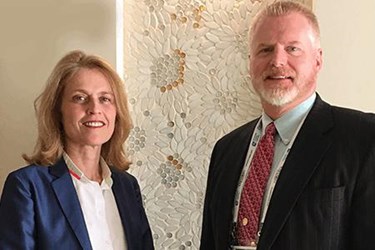A Woman Leader On The Subject Of Women As Leaders

By Rob Wright, Chief Editor, Life Science Leader
Follow Me On Twitter @RfwrightLSL

Editor’s Note: Sophie Kornowski-Bonnet, executive committee member and head of Roche partnering, is the subject of the November Life Science Leader magazine feature, “What Makes Roche’s Approach To Partnering Unusual.” The following short article has been developed for our Beyond The Printed Page online section which is free to access. Should you enjoy what you read, please consider becoming a monthly subscriber .
During my conversation with Sophie Kornowski-Bonnet, head of partnering at Roche, she had just finished sharing about her experience of working in Israel, and I posed a question about how she went about overcoming adversity when times seemed tough and she thought she might fail. “There are two things you can do,” she begins. “You can start looking behind and worrying, or you can stay focused on what’s ahead and take one step at a time.” She continues. “Let’s not kid ourselves; I’ve had failures. But I’ve survived. Besides, failures are often the best way to learn things.” When people face tough tasks, she advises getting input from lots of people, and not just the ones you like to listen to, but those who will tell you what you often don’t want to hear.
Her comment reminds me of when I was observing Wayne Koberstein interview John Lechleiter, then CEO of Eli Lilly & Company. It was during the April 2014, PhRMA annual meeting and earlier in the day it had been announced that Takeda and Lilly had been ordered to pay a combined $9 billion in punitive damages after a federal court jury found they hid the cancer risks of their Actos diabetes medicine. I share with Kornowski-Bonnet how I was surprised that such news didn’t cause Lechleiter to back out of the meeting. And while his willingness to “stay the course” given the recent bad news was pretty insightful, what I found more so was one of the comments made to Koberstein during the course of their conversation. It went something along these lines. “When you are the CEO, people always want to tell you the good news. But I tell people I want to hear the good and the bad, and when it is bad news, I’d rather hear it sooner than later.”
The comment seems to strike a chord with Kornowski-Bonnet, who says, “There is another interesting point, and it’s on the topic of women.” She shares that she was recently reading an article in the Wall Street Journal that said women leaders cannot be liked and still have an impact. “You are either responsible and deliver, or you are liked, but you cannot be both,” she explains. “As a woman, I find it remarkable at how many people are willing to give me feedback. Everybody has an opinion on what I should or should not have done, and I often wonder if men get this same flood of feedback. I find it impossible to discount, including when feedback comes from people I don’t necessarily respect.” She says that’s because there may be a piece of truth in it or perhaps some angle she should be paying attention to.
Then she does something unexpected: She asks me a series of questions, beginning with what surprises me most when interviewing executives. I am sure I rambled on about something insignificant, but in hindsight, it is probably that a woman leader of her stature was willing to be so open and candid during our interview. She follows by asking if I were a senior executive in the pharmaceutical industry, what would I do (or not do) differently. I responded that I’d like to see senior executives be a little less coached on how they speak. Many give too many platitudes and clichés. “Less coaching, more human, and a willingness to tackle the tough problems head on, because right now the biopharmaceutical industry is loathed by mankind, despite all the positives it has done,” I say. She agrees, stating, “There is an immense misunderstanding of what we actually do and how we actually do it.”
